- From Faith Current: “The Sacred Ordinary: St. Peter’s Church Hall” - May 1, 2023
- A brief (?) hiatus - April 22, 2023
- Something Happened - March 6, 2023

Several nowhere boys
ED PARK • Just saw this on Salon—a very good review of the Scorsese documentary on George and of “Nowhere Boy.”
I love that the author, Erik Nelson, describes himself as “a card-carrying Beatlemaniac, with a mail-order degree in advanced Moptopology.”
This is my favorite paragraph:
“A much scruffier and ultimately more revealing insight into the Beatles Creation Myth comes from the 2009 “Nowhere Boy.” This movie is set entirely in those moments when a strange kind of human alchemy transpired, in the grimy laboratory of Liverpool. No attempt is made to explain how the magic happened, but the viewer gets the distinct sense “why.” It’s ironic that one of the most insightful glimpses into the real George Harrison in “Living in the Material World” comes from a long excerpt from “A Hard Day’s Night,” where George stumbles into an advertising focus group, and returns the cynical condescension he is given with a far more withering detachment. The fact that this scene is wholly fictional does not diminish its insight – and the same thing can be said for “‘Nowhere Boy.'”
Yup.

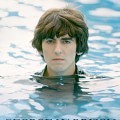
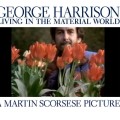
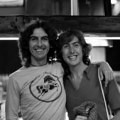
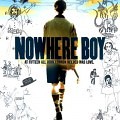


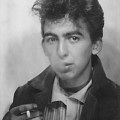
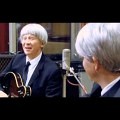

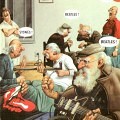


That WAS a good review. It captured both the weaknesses of the Harrison documentary (there was a Slate article making the same criticisms a while back but it was much harsher about both Harrison and Scorsese) and the strengths of the Nowhere Boy movie.
My only criticism of the Nowhere Boy movie was the actor who played Paul did not have Paul’s charm and physicality, which is a vague way of saying the actor wasn’t nearly as attractive as the real Paul. Plus the actor was too short and skinny whereas Paul at that age was as tall as John and a bit plump, from what observers say.
The day a movie or biography manages to capture the enigma that is McCartney, it will be a stunning piece of work.
— Drew
— Drew
Nice review, save for one line: “that ever-so-awful burden of huge fame and unlimited wealth.”
THAT is a comment utterly lacking in critical imagination.
I say this unto thee, readers: it is impossible to reach an understanding of the four people we called “The Beatles” without realizing that huge fame and unlimited wealth ARE ever-so-awful burdens. Can they be pleasant, satisfying, convenient? Yes. But all that comes at a terrible price, psychologically and spiritually. And in the case of The Beatles, the mortality rate is 50% (if you believe, as I do, that George’s final illness was hastened by the fan-attack he suffered in 1999).
It’s just a cheap oneliner, and I’m all for cheap oneliners–except when they’re actively corrosive, and that joke is corrosive in two ways. First, it keeps fans believing that if someone is rich and famous, they “owe” the fans. That’s wrong, and it’s a shorter step than we all would like to admit from “fucking rich asshole coasting on his name put out a crappy album” to “fucking rich asshole hypocrite I’m going to shoot him.”
The second, and much more pernicious angle is this: as long as we keep pretending that unlimited wealth and fame aren’t burdens—that they are good things that we all should strive for, and keep ignoring the vast evidence that they don’t make ANYBODY happy, and usually balloon people’s flaws—a lot of people who would otherwise live better, more useful, more contented, more positive lives, will instead spend them chasing wealth and fame. Most of the first world’s ills come from this misperception, and most of the third world’s ills could be ameliorated immediately if the first world would realize its error.
The Beatles will never make any sense to you as people until you make the imaginative leap from adorer to adored. John was not just some angry psycho; George was not just some sour asshole; Paul is not some saccharine teen idol; Ringo is not just a bit-player. They were guys who–in the face of a world that had gone insane, specifically about them–spent the rest of their lives coping with the toxic nature of that situation. If, every time you appeared in public, you got pawed and pestered and propositioned and sometimes even threatened, you’d get angry; you’d get bitter; you’d hide behind a facade; you’d drink and stew. And you’d have every right to.
Anybody who says, “Ho, ho–wish I had the problems a Beatle had,” needs to think more deeply and compassionately. That kind of wealth and fame is a curse, and the first thing it does is corrupt. Nothing was off-limits for The Beatles, and that is a terrible, terrible world to live in; that they all survived as more-or-less recognizable humans is one of their greatest achievements.
To what Michael has said so well I would only append a line recalled from last night’s rerun of “The Office” (which I watch habitually), delivered by Kelly Kapoor, the sweet but pea-brained and pop culture-obsessed customer service rep:
“How can someone that beautiful be so sad?”
To be read in this case as: “How can anyone with that much money and fame have any problems?”
“How can someone that beautiful be so sad?”
…because great sadness is often part of human beauty. Cf Marilyn Monroe.
“How can anyone with that much money and fame have any problems?”
…because some problems–some psychic injuries– create people with great charisma, which in our society leads to money and fame. Cf John Lennon.
Beauty is enjoyed by others; you only feel the sadness. Charisma is enjoyed by others; you only feel the mother not there.
Well said, Michael. That line does mar the review, and points to the much larger societal issues of simultaneously worshipping fame and money and hating the people who possess them (I think this twisted dynamic explains much about reality TV a la the Kardashians, btw).
Why do we persist in believing that fame and money lead to happiness when there is so much evidence to the contrary? Cintra Wilson’s book “A Massive Swelling: Celebrity Re-Examined as a Grotesque Crippling Disease” is a perceptive — and very funny — meditation on this.
I would bet the Salon writer included that particular line about the “ever-so-awful burden” of fame and wealth, purely as an attempt to avoid the inevitable nasty comments from readers in the online comments section. I’m sure the writer thought if he didn’t include that bit, a bunch of readers who post messages along the lines of “Cry me a river, being rich is such a burden.”
Journalists do this all the time these days — try to anticipate nasty comments and include phrases to circumvent.
But you’re right Michael. It’s a deeply superficial comment.
I’d like to applaud this paragraph that you wrote, however: “The Beatles will never make any sense to you as people until you make the imaginative leap from adorer to adored. John was not just some angry psycho; George was not just some sour asshole; Paul is not some saccharine teen idol; Ringo is not just a bit-player. They were guys who–in the face of a world that had gone insane, specifically about them–spent the rest of their lives coping with the toxic nature of that situation. If, every time you appeared in public, you got pawed and pestered and propositioned and sometimes even threatened, you’d get angry; you’d get bitter; you’d hide behind a facade; you’d drink and stew. And you’d have every right to.”
That’s good writing. — Drew
Aw, thanks, Drew. I think Ed’s currently holding this week’s crown for Best Writing, but I am always so grateful to hear that something I’ve written hit its mark.
I think about these issues a lot, partly because where I live (LA), but also because of my own life circumstances.
If I might share a bit with you: I was born in very dire circumstances, to a family cracked up much like John Lennon’s. To get into details would involve many stories that I am not at liberty to share, but trust me.
As a result, I developed a kind of charisma which is difficult to explain. It was weird, alienating, but I loved it. It was saving my life. It was redeeming my life.
This…thing…first got me to Yale–unimaginable to people of my background–and then put me on a track to be very, very rich and probably pretty famous, too. When I was 22, I was regularly heading down to New York having meeting with the owners of magazine companies, and it was not at all unlikely that within the next five years, I’d be the frontman of something big in comedy, which was that era’s rock and roll. To myself, I was blunt: I called it “becoming a Beatle.” That’s what I wanted, and that’s what I would’ve gotten.
Then I got sick.
Over the past 20 years, a mysterious, excruciating, very debilitating illness that no one can fix has stripped everything from me: my career, my finances, the idea of children, a sense of being able to control ANYTHING in my life. If you and I met, my primary concern would be getting through the meeting without throwing up in public.
If I could use drugs without going crazy, I would. If I could escape in any other way, I would. But there is no escape. There is only connecting how I can, when I can (with this blog for example, or with Downturn Abbey). And above all, there is acceptance.
In this totally unwilling acceptance there is clarity: what is being sought when one seeks money and fame? What is the condition one means to soothe? After twenty years of great physical suffering I find it can be soothed…but only by acceptance.
There are days when I grieve who I used to be, and the amazing, wonderful things that person would’ve created. I just wrote a killingly funny book in six weeks, going days without food and being so sick I could barely leave my house. On the days I can eat, I am that man Dullblogger Ed went to school with, the one my wife remembered 15 years after she saw him once, in the hall of our high school. It’s fun to be him. People react to him. I remember what it was like. I remember how it feels when the things of this world which we seek–money, fame, women–seem close.
But on the 99 other days, none of those things are available. I am simply myself. Not famous, not rich, not attractive, not special. Just myself. Is that enough? Sometimes it is; sometimes, instead, I grieve. But the pain under the grieving wouldn’t have been soothed by money and fame. Only by seeing through that illusion; only by acceptance.
John Lennon would’ve learned that. He wasn’t lucky enough to get sick at 22. He was a very unlucky man. God’s grace ruins your life, but it’s Grace nevertheless.
Sorry to be a downer, but it’s the real deal, and may help to explain why I say the things I do on this blog. Which, btw, is a great pleasure and comfort to me. Thank you.
And this is why I keep coming back to this blog: great writing and a willingness to be honest. Thanks for writing about your own experience, Michael: it helps me understand how you could write with such insight about Lennon, in particular, in “Life After Death . . .”
A whole book could be written about how each Beatle dealt with what Cintra Wilson calls “mega-mega-megafame” and the “deadly blue heat of its X-ray eye.”
John played dodge-em with that megafame, tried to direct its spotlight, walked away from it, and warily re-engaged with it just before his murder. George was ambivalent about it from the start, and seems to have used spiritual discipline in an effort to keep it from burning through his life. Paul basked in it, got burned by it, and constructed a persona that stands in the glare while the man behind the curtain is shielded. Ringo seems to have blinked in it, to have had his destructive tendencies encouraged by it, and now to be perpetually wearing sunglasses as a defense against it.
Carrying that weight was not optional for any of them, once megafame hit.
Thank you for sharing your story, Michael. And thank you for this blog. If nothing else, know that you give is all great joy and incredible insight with your writing. I am absolutely loving Life After Death.
Nancy, I love how you can so succinctly convey the public personas of each Beatle. I think you are dead on with those observations.
Sometimes I do feel very for Paul. Some people, like the ones mentioned above who would be aghast at someone feeling empathy for a man of Paul’s stature, would find this strange. But he sometimes just seems…sad. He recently gave a quote about how he’s getting tired, and how fame has and is really taking a tole. I hope with all of my heart, because this man and his 3 friends have given me more happiness and excitement and pure gratification, but mainly an extremely pleasant diversion from that which is life, that he has found real love and contentment with Nancy.
Thanks, Craig–but Dullblog has been a joint-effort from the get-go. It was Ed’s idea, and Devin’s what makes it special. Nancy and our commenters are our secret weapon. I’m delighted to be blog-mom.
‘member now, Paul’s nearly 70. It’s natural for him to be tired, to downshift. FWIW, I think that he’s had the life he’s wanted to have.
Craig, you may not have listened to enough of George’s demos, a number of which are first-rate and never made albums. Granted, they come out of the Beatle years, but they are solo and they are there. Also, have you heard Brainwashed? Beautiful album, almost flawless. Half of Living in the Material World is gorgeous, the other half dire and disappointing. After that, most of his albums suck.
Most of my homemade best-of-solo-George CD comes from ATMP and Brainwashed, but here are the ones that don’t:
Living in the Material World:
Give Me Love
Don’t Let Me Wait Too Long
Be Here Now
That is All
33 1/3:
This Song
Traveling Wilburys:
Handle with Care (mostly George-written and sung)
Demos, outtakes and rough takes:
You
I Don’t Wanna Do It
Nowhere to Go
I Live for You
Window Window
Beautiful Girl
Add those to the best of ATMP (which I love) and Brainwashed, and I needed two discs to fit them all. And every one is Beatle-worthy.
Thanks, Devin. I’ll check those out. I do admit I havent closely listened to the Harrison discography. Perhaps I am missing out on some good music, though for now I still stand by the fact that there aren’t many great songs by George.
I will chime in and say, about NOWHERE BOY—I agree with Drew’s comment about the actor playing Paul.
You know who would have been perfect? The actor who played Edmund in THE LION, THE WITCH, AND THE WARDROBE (though maybe he would have since aged too much to take on the role).
Also, the actor who played George, uh, looked nothing like George!
(I did like the movie, in any event.)
When I watched NOWHERE BOY, I rationalized that, like most of us, “Paul McCharmly” was a work-in-progress at age fifteen and that the attractive, self-assured, breezy, charismatic, and PR-conscious character we all know today began to take shape long after the events of this movie.
Consider Hamburg, for example. The exis were mad for Stu, John, and George, in that order. To them, Pete and Paul were afterthoughts.
After the band returned to Liverpool from Hamburg, Pete was the fan favorite, not Paul.
In my opinion, Paul grew into his looks during 1963.